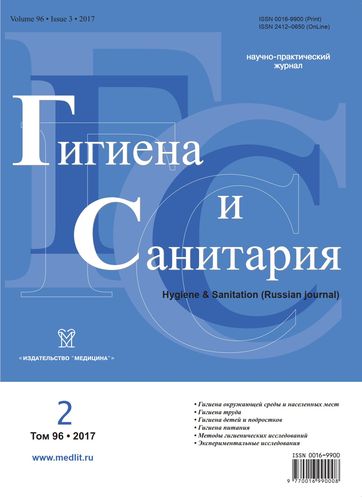Biochemical protective mechanisms in the accumulation of heavy metals in organisms
- Authors: Petukhov A.S.1, Petukhova G.A.1
-
Affiliations:
- Tyumen State University
- Issue: Vol 96, No 2 (2017)
- Pages: 114-117
- Section: ENVIRONMENTAL HYGIENE
- Published: 21.10.2020
- URL: https://edgccjournal.org/0016-9900/article/view/640595
- DOI: https://doi.org/10.47470/0016-9900-2017-96-2-114-117
- ID: 640595
Cite item
Full Text
Abstract
At present due to the environmental contamination by heavy metals there is a great interest to investigate the processes of their both accumulation in plants and toxic effect on biochemical indices. Therefore the objective of this research was the analysis of the alteration of the system of antioxidant protection ofplants in conditions of soil contamination by copper and zinc. Research object were germinants of oat in amount of300 plants in each variant of the experiment. For the performance of the experiment, the sand was equally contaminated by sulfates of Cu and Zn in concentration of 2 MPC on its gross content in soil. The experiment lastedfor 2 weeks. For the implementation of the objective of research there was analyzed the contentof both Cu and Zn in plants exposed to soil contamination. Additionally there was performed an analysis of as the content of lipids peroxidation products, phenols and flavonoids; as well the activity ofperoxidase, catalase and photosynthetic system. Under the soil contamination by copper and zinc corresponding to 2 MPC the accumulation of heavy metals was established to be happening in plants. If compared copper accumulation was higher than zinc accumulation that can be explained by the high migration capability of zinc. Under combined impact of two metals there was revealed their antagonistic interaction. There was established an elevated content of lipids peroxidation products in cells as a sequence of the accumulation of heavy metals in plants. As a result of the elevation of the content of lipids peroxidation products there was revealed a raised activity ofphotosynthetic apparatus and antioxidant system (carotenoids, catalase and peroxidase) in the cell. The decrease of the content ofphenols and flavonoids is related with the usage of this system of antioxidant protection for the neutralization of lipids peroxidation processes.
About the authors
A. S. Petukhov
Tyumen State University
Author for correspondence.
Email: noemail@neicon.ru
Russian Federation
Galina A. Petukhova
Tyumen State University
Email: gpetuhova1@mail.ru
Russian Federation
References
- Башкин В.Н., Касимов Н.С. Биогеохимия. М.: Научный мир; 2004.
- Масленников П.В. Реакция антиоксидантной системы чины приморской (Lathyrus maritimus bigel.) на действие ионов кадмия. Актуальные проблемы гуманитарных и естественных наук. 2013; (11-1): 67-70.
- Фазлиева Э.Р., Киселева И.С. Биохимические реакции растений Tussilago Farfara L. Из природных местообитаний с разным уровнем техногенного загрязнения на избыток меди в среде. Известия Тульского государственного университета. Естественные науки. 2011; (3): 246-56.
- Ли Т.К., Лу Л.Л., Жу Е., Гупта Д.К., Ислам Е., Янг Х.Е. Антиоксидантная система в корнях двух контрастных экотипов Sedum Alfredii при повышенных концентрациях цинка. Физиология растений. 2008; 55(6): 886-94.
- Корнилов А.Л. Биохимические показатели и содержание тяжелых металлов в растениях береговой линии водоемов г. Тюмени в условиях антропогенного загрязнения: Автореф. дисс. ... канд. биол. наук. Тюмень; 2014.
- Мукатанов А.Х. Вопросы эволюции и районирования почвенного покрова Республики Башкортостан. Уфа: Гилем; 1999.
- Методика определения содержания тяжелых металлов в золе растений. М.: Высшая школа; 1990.
- Шульгин И.А., Ничипорович А.А. Хлорофилл. В кн.: Шульгин И.А., Ничипорович А.А. Расчет содержания пигментов с помощью номограмм. Минск: Наука и техника; 1974: 127-36.
- Шведова А.А., Полянский Н.Б. Метод определения конечных продуктов перекисного окисления липидов в тканях - флуоресцирующих шиффовых оснований. В кн.: Бурлакова Е.Б., ред. Исследование синтетических и природных антиоксидантов in vitro и in vivo. М.: Наука; 1992: 72-3.
- Федорова А.И. Практикум по экологии и охране окружающей среды. М.: ВЛАДОС; 2001.
- Третьяков Н.Н., Кошкин Е.И., Новиков Н.Н. Физиология и биохимия сельскохозяйственных растений. М.: Колос; 2000.
- Ермаков А.И., Арасимович В.В., Ярош Н.П., Перуанский Ю.В., Луковникова Г.А., Иконникова М.И. Методы биохимического исследования растений. Ленинград: Агропромиздат; 1987.
- Королюк М.А., Иванова Л.И., Майорова Н.О., Токарев В.Е. Метод определения активности каталазы. Лабораторное дело. 1988; (1): 16-9.
- Лакин Г.Ф. Биометрия. М.: Просвещение; 1980.
- Кабата-Пендиас А., Пендиас Х. Микроэлементы в почвах и растениях. Пер. с англ. М.: Мир; 1989.
- Петухова Г.А. Механизмы устойчивости организмов к нефтяному загрязнению среды. Тюмень: ТюмГУ; 2008.
- Марри Р., Греннер Д., Мейес П., Родуэлл В. Биохимия человека. Том 1. М.: Мир; 1993.
- Полевой В.В. Физиология растений. М.: Высшая школа; 1989.
Supplementary files









